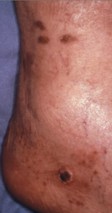Section 2: HIV/AIDS

Test your knowledge of all the HIV/AIDS pages with the HIV/AIDS Quiz
Impacts
E:
Contents:
The impacts of HIV/AIDS can be devastating for the individual who is diagnosed as having the disease.
Testing
The impacts of knowing you have tested positive can be psychologically traumatic.
Because at the moment there is no cure, finding out you are HIV+ may make you feel as if you have been given a death sentence. Even if during the early stages of the disease there are no physical symptoms, the knowledge that you are HIV+ can have a great impact on your life. It is not surprising then that people often either don't feel that they are at risk, or don't want to take a HIV test, even where it is free.
Because of this, in many countries you have to go through a course of counselling before you can be tested for HIV. Counselling is certainly very helpful if the result of the test shows that you are HIV+. Unfortunately, in many countries in the developing world, such as in Africa, formal counselling isn't available.
There are drugs, called anti-retrovirals (ARVs) that can be given to people who are HIV+. These don't cure HIV but will increase the amount of time people can live with the disease. The fact that these drugs exist gives people a reason to take an HIV test.
However, in areas of the world (such as Africa and other developing countries) where the drugs aren't readily available, people are even less likely to take the test.
Public health
Even if there are no drugs available, it is important to identify carriers of the disease for public health reasons.
People who have HIV can then be taught about the ways in which they can avoid spreading the disease (such as not having unprotected sex, not breastfeeding and not sharing needles).
Physical symptoms
The first physical symptoms of HIV are often weakness and being ill more often because the body is less able to fight off infection.
Some common physical signs are rapid weight loss and/or skin lesions because the body is more susceptible to certain types of skin cancer.
The picture on the left shows Kaposi's sarcoma lesions located over the left ankle and foot. Not all, but the vast majority of cases of Kaposi's sarcoma are found in patients with AIDS as the reduced immune system makes the body more vulnerable.
Because there is no treatment for HIV, everyone who is infected eventually dies. They often die of an infection they have caught because of their weakened immune system.
Psychological affects
From the time a person finds out they are infected, they, and their close family may suffer from psychological trauma from knowing that the infected person will not recover from the disease. In addition to this, people with HIV/AIDS often have to deal with prejudice and discrimination and the widespread assumption that it is their own fault that they got the disease.



Source: CDC image library
As well as the impacts on the individual, HIV/AIDS also impacts on society and the economy. These public impacts are worst in areas with high HIV rates. In areas with lower HIV rates these impacts may be less, but the impacts on the individual will still be the same.
The table below shows the impacts of HIV on the economy, public services and social relations for local communities and whole countries (national).
If you click on more you will get more detail about the impact of HIV in Eastern and Southern Africa where HIV prevalence is high.

| Impacts on economy |
Impacts on public services |
Impacts on social relations |
||
| Local scale | Impacts on farm production, on domestic activities and on individual businesses. |
Fewer people attend school. More pressure on health care services (e.g. doctors and hospitals). |
Household and community relationships change. |
|
| National scale | National income falls because individual productivity falls. |
Shortage of teachers and medical staff because of illness and death. Fewer resources for public services. |
Social and cultural trauma. Problems with stigma and 'blame'. New attitudes to relationships. |
|
As we've just seen, HIV/AIDS has a major impact in countries where the disease is prevalent.
The countries with high rates of HIV/AIDS also tend to be economically poor and often are faced with many other problems to do with governance, environmental management and social inequality.
HIV/AIDS seems to be yet another factor making Africa's chronic poverty worse. Because of the impacts on the economy, services and social relations, HIV/AIDS is more than just a health problem but can also seriously limit the economic development of a country.
Governments now see HIV/AIDS as part of their broader development needs and programmes rather than as a single disease to be tackled directly on its own.
Measures to deal with causes and impacts of HIV/AIDS have been 'mainstreamed' into broader development programmes and especially into poverty alleviation programmes.

1. Why is it important to identify the carriers of the HIV virus by blood testing?
2. True or false? Which of these applies to the impacts of HIV/AIDS in the most severley affected countries of Eastern and Southern Africa?
HIV/AIDS needs to be tackled seperately from other development problems
HIV/AIDS mortality reduces African chronic problems of food shortage









